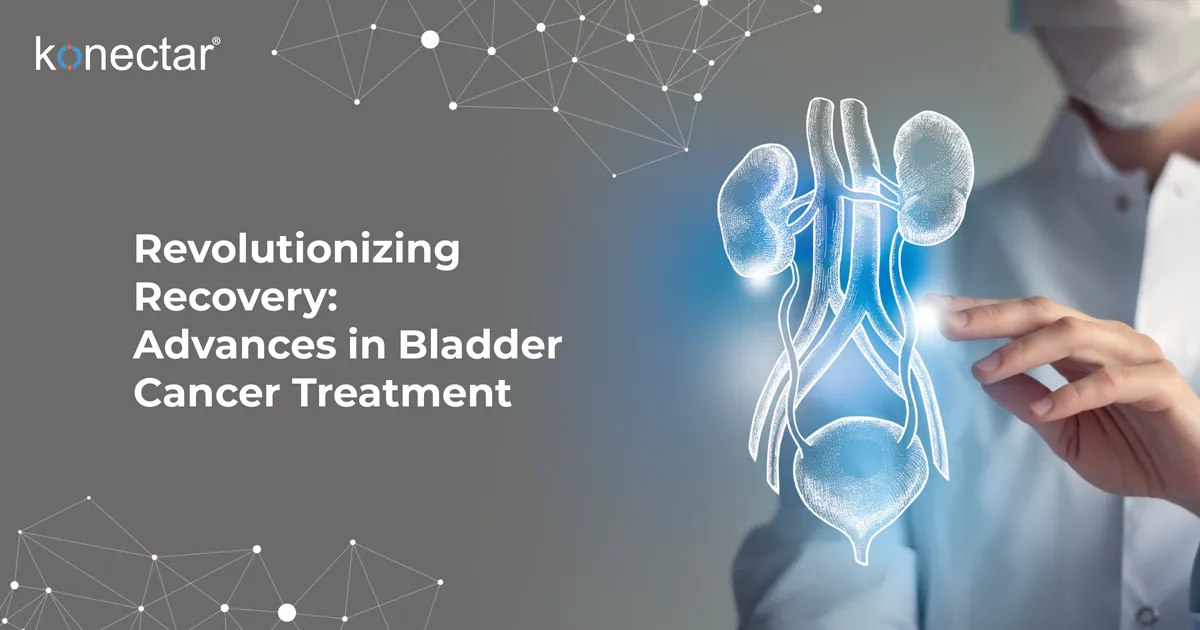06-12-2023
Revolutionizing Recovery: Advances in Bladder Cancer Treatment

Bladder cancer, a condition affecting millions globally, requires a nuanced approach to treatment. However, the landscape for bladder cancer treatment worldwide has become dynamic and continually evolving, with healthcare systems and approaches varying across regions. The global effort to combat bladder cancer today involves a combination of conventional treatments and cutting-edge innovations.
In this article:
Conventional Blood Cancer Treatments
The approach to treating bladder cancer depends on the specific characteristics and extent of the cancer. This ensures a targeted and effective intervention. The treatment modalities for bladder cancer are outlined below.
-
Transurethral bladder tumor resection (TURBT)
Transurethral bladder tumor resection (TURBT) is a multifaceted procedure employed for both diagnostic and staging purposes, along with therapeutic interventions. In this method, a cystoscope is skillfully inserted by the surgeon through the urethra into the bladder to excise the tumor.
-
Radical cystectomy and lymph node dissection
A radical cystectomy, coupled with lymph node dissection, is a comprehensive surgical approach that involves the complete removal of the bladder. This may include the prostate and a segment of the urethra in male patients or the uterus, fallopian tubes, ovaries, and a portion of the vagina in female patients. The procedure is an extensive intervention designed to address the advanced stages of bladder cancer.
In the case of all patients, the removal of pelvic lymph nodes, known as a pelvic lymph node dissection, is a standard procedure. For enhanced precision in detecting cancer that may have disseminated to the lymph nodes, an extended pelvic lymph node dissection is deemed the most accurate method. This meticulous approach aims to thoroughly investigate the presence of cancer beyond the bladder, aiding in a comprehensive assessment of the disease's extent.
-
BCG treatment for bladder cancer
BCG, short for Bacillus Calmette-Guérin, stands as an intravesical immunotherapy drug integral to the treatment of bladder cancer. This intravesical treatment involves the instillation of drugs directly into the bladder, effectively flushing it with agents designed to eliminate residual cancer cells post-surgery. This proactive approach significantly diminishes the likelihood of cancer recurrence.
-
Systemic immunotherapy
It plays an important role in urothelial cancer treatment, a specific type of bladder cancer. This type of therapy includes avelumab, nivolumab, and pembrolizumab. The mechanism of action of these drugs is multifaceted, operating on various fronts to effectively eliminate cancer cells.
-
Chemotherapy
This type of therapy includes two treatment approaches: Systemic Chemotherapy and Intravesical Chemotherapy. In systemic chemotherapy for bladder cancer, drugs like carboplatin, cisplatin, doxorubicin, fluorouracil (5-FU), gemcitabine, methotrexate, mitomycin, paclitaxel, and vinblastine are injected into a vein. This allows the drugs to circulate in the bloodstream, reaching cancer cells in Intravesical Chemotherapy. Intravesical chemotherapy involves introducing drugs directly into the bladder. This targeted approach flushes the bladder with drugs to eradicate remaining cancer cells post-surgery, thereby reducing the risk of cancer recurrence.
Key Considerations for the Selection of Bladder Cancer Treatment
Selecting an appropriate treatment strategy for bladder cancer involves a meticulous consideration of several key factors and each one of it plays a crucial role in determining the most effective course of action. Cancer type, stage, and grade form the foundation for tailoring a personalized treatment plan.
-
Cancer Type
Bladder Cancer can manifest in various forms, such as urothelial carcinoma, squamous cell carcinoma, and adenocarcinoma. Each type may exhibit distinct characteristics, influencing the choice of therapies that best target the cancer's unique features.
-
Cancer Stage
The Stage of Bladder Cancer, indicating the extent of its spread, significantly guides treatment choices. Non-muscle invasive bladder cancer (NMIBC) is confined to the inner lining of the bladder, while muscle-invasive bladder cancer (MIBC) infiltrates the muscle layer. Advanced stages may involve the spread to nearby organs or distant metastasis. The stage dictates whether surgery, chemotherapy, radiation, or a combination is most appropriate.
-
Cancer Grade
Cancer Grade reflects the level of abnormality and aggressiveness of the cancer cells. Typically categorized as low-grade (well-differentiated) or high-grade (poorly differentiated), the grade influences the tumor's growth rate and potential to spread. High-grade tumors often require more aggressive treatment approaches to address their rapid proliferation and increased likelihood of recurrence.
To develop a tailored treatment plan, Healthcare Professionals consider the above factors, along with the patient's age, medical history, and other factors.
Insights into the current landscape of Bladder Cancer Clinical Trials
Scientists globally are investigating methods for diagnosing and treating bladder cancer. Recent progress in immunotherapy and targeted therapy is poised to make bladder cancer treatment more effective and less harmful.
Researchers are currently exploring the efficacy of immune checkpoint inhibitors in primitive stages of the cancer along with its combination with other treatments like chemotherapy. The AMBASSADOR trial, sponsored by the NCI, is investigating the immune checkpoint inhibitor pembrolizumab (Keytruda) versus observation in Patients with localized muscle-invasive or locally advanced bladder cancer that has been surgically removed. The trial aims to determine whether pembrolizumab improves overall survival or disease-free survival.
The ESMO (European Society for Medical Oncology) presidential session will unveil findings from a phase-3 trial. This trial introduces a novel combination involving an antibody-drug conjugate and immune checkpoint inhibition, specifically Enfortumab Vedotin + pembrolizumab. The study demonstrates a clinically meaningful enhancement in both overall survival and progression-free survival.
In the CheckMate 901 Trial, a new mix of drugs—nivolumab and gemcitabine-cisplatin—was tested against just chemotherapy. Results showed a 22% lower risk of death for patients getting both drugs compared to those on chemotherapy alone. The combined nivolumab and chemotherapy approach also significantly improved progression-free survival compared to chemotherapy alone.
A Phase 3 study compares Erdafitinib, standard chemotherapy, and pembrolizumab in advanced bladder cancer patients with FGFR gene alterations. The goal is to determine which treatment—Erdafitinib, an immune checkpoint inhibitor, or chemotherapy—is more beneficial for individuals with FGFR-altered bladder cancer.
In an early-phase clinical trial focused on individuals with muscle-invasive bladder cancer, the exploration involves the combination of Durvalumab (Imfinzi) and Tremelimumab administered before surgery. This approach aims to potentially shrink the tumor and minimize the extent of normal tissue removal required during the surgical procedure.
Another clinical trial in the UK is seeking participation from volunteers in a trial that requires urine samples from individuals undergoing investigation for potential bladder cancer, scheduled for a standard-of-care cystoscopy and biopsy. The objective is to assess the detectability of the UroX biomarker in urine samples, exploring its potential as a diagnostic tool for patients.
FAQs
-
What is the duration of BCG treatment for bladder cancer?
BCG (Bacillus Calmette-Guérin) treatment for bladder cancer typically consists of an initial induction phase followed by maintenance therapy. The induction phase involves weekly treatments for six weeks, and if the cancer responds positively, maintenance treatments may be recommended. Maintenance schedules vary but can extend up to three years with less frequent sessions.
-
What is the latest treatment for bladder cancer?
The field of bladder cancer treatment is dynamic, with ongoing research and development. Immunotherapy, particularly immune checkpoint inhibitors like Pembrolizumab and Atezolizumab, has shown promise in advanced cases. Additionally, targeted therapies and personalized medicine approaches are being explored, marking a shift toward more precise and effective treatments.
-
How fast does bladder cancer spread without treatment?
The rate at which bladder cancer spreads without treatment varies widely and depends on factors such as the type and stage of cancer. In aggressive cases, bladder cancer can progress rapidly, spreading to nearby tissues and organs. However, the speed of progression is highly individual and highlights the importance of quick diagnosis and intervention.
-
What is the cost of BCG treatment for bladder cancer?
The cost of BCG treatment for bladder cancer can vary based on various factors. This includes location, healthcare provider, and insurance coverage. Generally, BCG therapy involves multiple sessions, and costs may include medication, administration, and associated medical services.
-
What is the most common treatment for bladder cancer?
The most common treatment for bladder cancer depends on the stage and grade of the tumor. For non-muscle-invasive bladder cancer, transurethral resection followed by intravesical therapy, often with BCG, is common. For muscle-invasive cases, radical cystectomy (removal of the bladder) or a combination of surgery, chemotherapy, and radiation therapy may be recommended
-
How long can you live with stage 4 bladder cancer without treatment?
The survival rate for stage 4 bladder cancer without treatment is generally poor. However, outcomes may vary based on factors like overall health as well as the progression of the cancer. Without treatment, the cancer is likely to progress, leading to a decline in Quality of life and reduced life expectancy.
-
What is the success rate of BCG treatment for bladder cancer?
The success rate of BCG treatment for bladder cancer varies. In cases of non-muscle-invasive bladder cancer, BCG can be highly effective in preventing cancer recurrence. Success is often measured by the absence of tumor growth during follow-up examinations. However, individual responses vary, and the effectiveness of BCG may be influenced by factors such as the type and stage of bladder cancer. Regular monitoring and follow-up are crucial for assessing treatment success.
Challenges and Future Outlook
There are several key considerations that underscore the current state of affairs and highlight the potential pathways for progress. Early diagnosis remains a significant challenge in bladder cancer. The absence of distinctive symptoms in the early stages often leads to delayed detection, impacting treatment outcomes.
While there have been advancements, treatment options for bladder cancer remain somewhat limited. Striking a balance between effective treatment and minimizing adverse effects is a continual challenge.
Amidst these challenges, the evolution of immunotherapy, particularly immune checkpoint inhibitors, holds promise for improved treatment outcomes. Ongoing research and Clinical Trials explore novel immunotherapeutic approaches for bladder cancer. The future of bladder cancer treatment may see a more personalized approach with the identification and utilization of specific biomarkers.
Innovations in non-invasive, early detection technologies, such as liquid biopsy and advanced imaging, could revolutionize the diagnosis and monitoring of bladder cancer. The exploration of combination therapies, including a mix of immunotherapy, targeted therapy, and traditional treatments can help in effective management of bladder cancer. These ongoing efforts to improve early detection, enhance treatment modalities, and prioritize the overall well-being of individuals affected by bladder cancer are paving the way for a more hopeful future.





